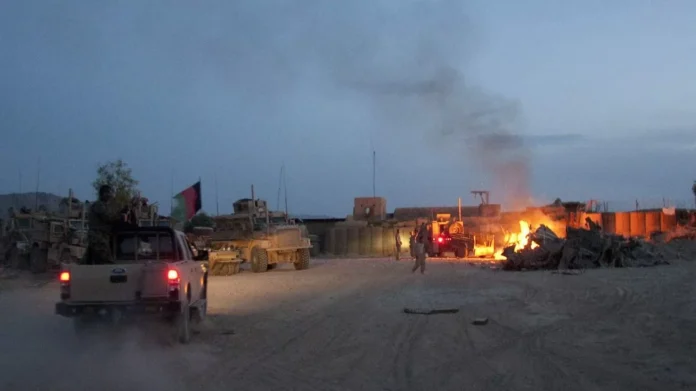Democratic lawmakers and veterans’ groups are outraged over a provision in the recently passed stopgap federal spending bill by House Republicans. The provision in question would cut a Department of Veteran Affairs fund that provides financial support for veterans suffering from illnesses linked to military burn pits and other chemical exposure. This move has sparked widespread condemnation and raised concerns about the well-being of our brave servicemen and women.
The six-month government spending package, which largely holds federal agencies at current funding levels, includes a provision that would transfer $5 billion from the Department of Veteran Affairs’ (VA) health care budget to cover a shortfall in the Department of Defense’s (DOD) health care budget. This transfer would result in a significant cut to the VA’s budget, specifically the Burn Pit Registry and the Airborne Hazards and Open Burn Pit Registry.
The Burn Pit Registry was created in 2013 to help track and monitor the health effects of exposure to burn pits and other hazardous materials during military service. It allows veterans to document their exposure and provides them with access to resources and medical care. The Airborne Hazards and Open Burn Pit Registry was established in 2014 to collect data on the long-term health effects of exposure to burn pits and other airborne hazards.
These registries have been a lifeline for many veterans who have been suffering from various health issues as a result of their exposure to burn pits and other hazardous materials during their service. From respiratory illnesses to cancer, these brave men and women have been struggling with debilitating health conditions that have significantly impacted their quality of life.
The decision to cut funding for these crucial programs has been met with fierce opposition from Democratic lawmakers and veterans’ groups. They argue that the VA should not be forced to bear the burden of the DOD’s financial shortfall and that veterans should not have to pay the price for their service.
Representative Mark Takano, the chairman of the House Veterans’ Affairs Committee, expressed his disappointment in the provision, stating, “This is a shameful attempt to balance the books on the backs of our veterans, who have already sacrificed so much for our country.”
Similarly, the Veterans of Foreign Wars (VFW) and Disabled American Veterans (DAV) have both condemned the move, calling it a “betrayal” to those who have served. They argue that the VA’s budget should not be used as a “piggy bank” to cover other agencies’ shortfalls.
The impact of this provision would be felt by thousands of veterans who have bravely served our country. It would not only result in a reduction of resources and medical care for those already suffering from illnesses, but it would also discourage other veterans from seeking help and enrolling in the registries.
The VA has estimated that over 3.5 million servicemen and women have been exposed to burn pits and other hazardous materials during their deployments. This is a staggering number, and it is our duty as a nation to provide them with the necessary support and care they need and deserve.
Fortunately, there is still time to rectify this situation. The Senate has yet to pass the spending bill, and there is an opportunity to remove this harmful provision. It is imperative that our lawmakers prioritize the well-being of our veterans and ensure that they have access to the resources and care they need.
We must also address the root cause of this issue – the continued use of burn pits and other hazardous materials in military operations. It is unacceptable that our servicemen and women are being exposed to these harmful substances without proper protection and precautions. The government must take immediate action to address this issue and find alternative methods of waste disposal.
In conclusion, the provision in the stopgap federal spending bill that would cut funding for the VA’s Burn Pit Registry and Airborne Hazards and Open Burn Pit Registry is a grave injustice to our veterans. It is our duty to stand with them and demand that their health and well-being be prioritized. We call on our lawmakers to remove this provision and ensure that our veterans receive the support and care they deserve. Let us not forget the sacrifices they have made for our country, and let us honor them by taking care of their needs.

